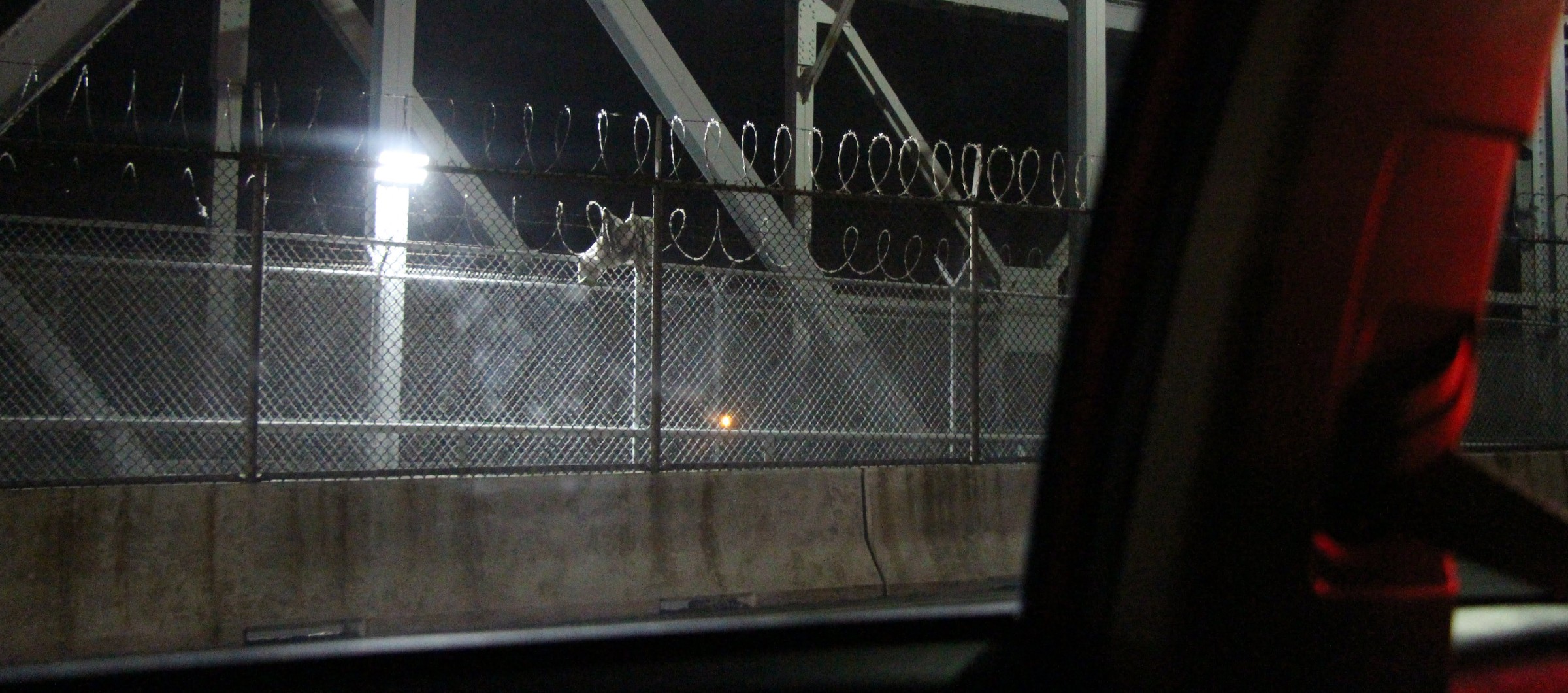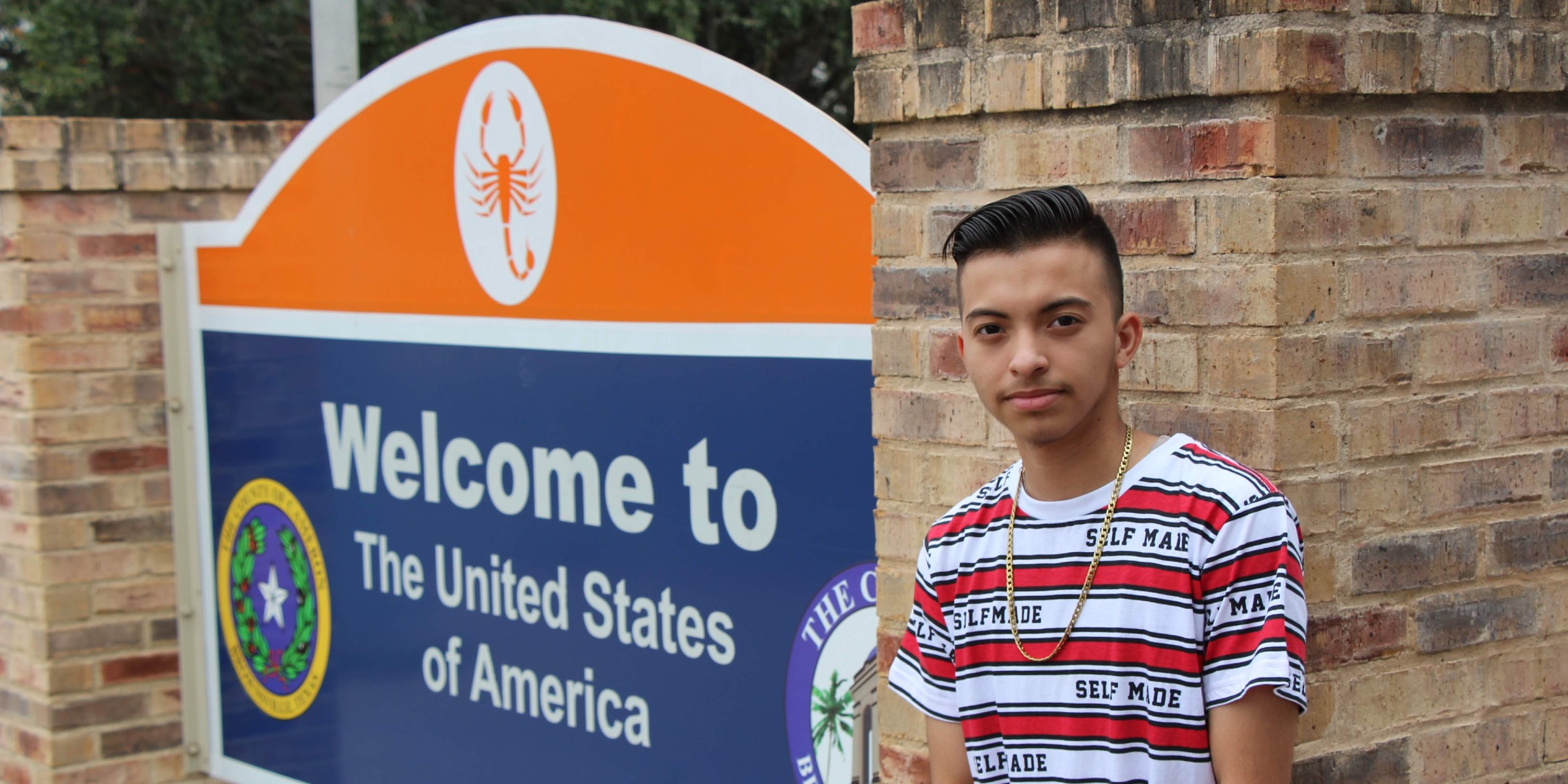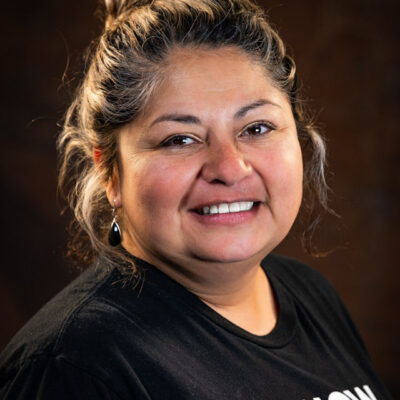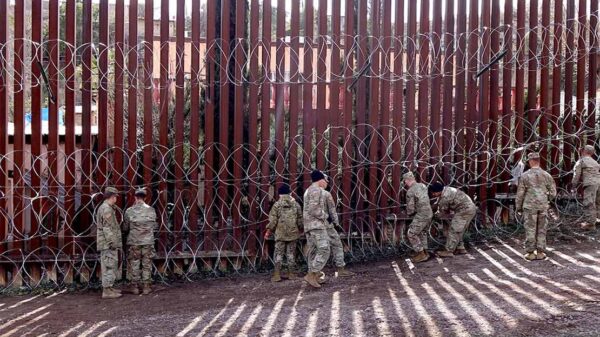Chris Gallegos is a young man born and raised in the Rio Grande Valley (RGV).Like many other young people, he goes to school, works, and hangs out with his friends. He also visits his girlfriend — who lives across the border in Matamoros, Mexico — on an almost daily basis. For many residents who live in the borderlands, crossing back and forth between the U.S. and Mexico is a part of everyday life.For Chris, it’s a little different. Unlike most other residents who are able to cross back into the U.S. at the Customs and Border Protection (CBP) check points without much fanfare, Chris faces another reality. Chris is transgender, and because of that, he is regularly harassed by CBP agents upon his daily returns to the U.S.
Chris Gallegos is a young man born and raised in the Rio Grande Valley (RGV).
Like many other young people, he goes to school, works, and hangs out with his friends. He also visits his girlfriend — who lives across the border in Matamoros, Mexico — on an almost daily basis. For many residents who live in the borderlands, crossing back and forth between the U.S. and Mexico is a part of everyday life.
For Chris, it’s a little different. Unlike most other residents who are able to cross back into the U.S. at the Customs and Border Protection (CBP) check points without much fanfare, Chris faces another reality. Chris is transgender, and because of that, he is regularly harassed by CBP agents upon his daily returns to the U.S.

Chris Gallegos in downtown Brownsville.
Since Chris legally changed the name on his Texas state ID, he has endured everything from inappropriate questioning, to CBP agents putting him in unsafe situations by “outing” him as transgender. Now, he is speaking up, encouraging other transgender people — those that live in the borderlands and those who are traveling back to the U.S. at other ports of entry — to do the same. He is asserting that his rights do not just disappear at the border.
Chris invited ACLU of Texas staff members Imelda Mejia and Maria Cordero to accompany him during one of his returns to the RGV. Below is a transcript of the recorded conversation they had while in the car line to cross the CBP checkpoint in Brownsville. During the conversation, Chris describes his experiences, and his call to other transgender people who may also be experiencing harassment while entering the U.S.
IMELDA MEJIA (ACLU of Texas): You have told me that sometimes CBP asks you a lot of questions [at the border when entering the U.S.]. Can you tell me why?
CHRIS GALLEGOS: It’s because in April I changed my name [on my Texas driver’s license], and that process took longer than I expected. Now I don’t have my birth certificate under the same name nor my passport. All of my documents, except for my Texas ID, are under my dead name, and for that reason they ask me more questions.

Chris monitoring his speed as his car approaches the CBP checkpoint on his way back to the U.S.
IMELDA: How often are you pulled aside and questioned more?
CHRIS: Um, almost every time I cross, like 80% out of 100.
IMELDA: How does that make you feel?
CHRIS: Well, I see everybody else just cross. I don’t think it’s fair. Then sometimes I also get questioned, like [about] my dead name. My passport has my dead name, and [the agents] read it out loud. And it’s like every time I cross, they never know if I’m with someone that doesn’t know I’m transgender. And they read it out loud and [the CBP agents are] like, “Really!? I never would have guessed. Who would have ever thought!” And I don’t think that’s something you tell a transgender person.
Then other times they pretend that they’re looking up my information in their computer, but they’re just making up more questions. Because they do ask, “Oh how long did this take?” or “How did you do it?” or “How did you know?” And I mean I answer them because who else is going to educate them, right? But I really wish I didn’t have to explain my [personal] life every single time I cross…. Sometimes I’m just not in the mood to answer those types of questions, but I [feel like I] have to answer if I want to go back home.

Every day, tens of thousands of vehicles pass through the Brownsville CBP check points.
IMELDA: Have they ever threatened you with anything that you know is wrong?
CHRIS: They’ve threatened to detain me and keep me from crossing back and forth because my documents aren’t all the same name.
IMELDA: What have you learned about your rights while crossing the border?
CHRIS: I research about my rights, I always do. I like to know what I can do and what I can’t do, what’s legal and what’s not legal. I think knowing your rights is really important because if they tell you something when you cross, you can be like, “Oh, I know my rights.”
For example, I get threatened that I’m going to get detained [by CBP], which they can’t really do because I’m a U.S. citizen. What do you mean you’re going to detain me? I have my papers, my birth certificate, my passport….

The view from the car line on the old bridge that connects Matamoros, Mexico to Brownsville.
IMELDA: Do you have to emotionally prepare before you cross?
CHRIS: Yeah, definitely. I got stopped for about 15 minutes and I had an anxiety attack. I wasn’t prepared. I didn’t know that [the CBP officer] was going to turn out as angry or upset [as she did]. Because I had a good night that day, I remember. And it just went wrong when I tried crossing. I try to prepare myself, but I get scared. Every time I cross now, it’s like, oh just get ready for the questions. Or I try to get mentally prepared.
IMELDA: So if you had to summarize and break it down to three things that people should know before crossing the border into the U.S., it would be 1) Be mentally prepared, 2) Have a game plan to handle questions from CBP...
CHRIS: The third one would be “speak up.” I don’t think anyone should keep any problems to themselves with [their rights]. A fourth would be…if there’s any problems reach out for help. What I should have done was ask for a supervisor that night [I had an anxiety attack], or someone that’s higher than a [regular] U.S. Customs officer.

Chris waits in his car awaiting to approach the U.S. Customs and Border Protection check point in Brownsville.
IMELDA: Is there anything else you would like to say to other transgender travelers who may experience harassment from CBP agents?
CHRIS: For the five minutes, 10 minutes that they make you wait, that they hold you back, to me that’s nothing. Because at the end of the day, I’m still myself. And that’s the way I see it, that’s the way I try to tell myself. Like ok, they can think whatever, they can say that you’re this, you’re that. But only I know who I am. And that’s something that they can’t take away from me. That’s the power of being transgender; only you know who you are.
Voices of the Rio Grande Valley: How Extremist Federal Policies Continue to Threaten Texas’ Borderlands. Over the next several weeks, the ACLU of Texas, in collaboration with staff and community members based in the Rio Grande Valley (RGV), will be sharing a series of essays, photos, and videos that demonstrate the region’s ongoing struggle to ward off intrusion of federal policies on everyday life. While many of these policies are not new to the RGV, they have been ramped up under the Trump administration, which has used the borderlands, its people, and its resources as pawns in a political game. But the people of the Rio Grande Valley are not staying silent. Join us as we explore the rich history, culture, and environment of this region in southeast Texas, and how its residents are fighting back to preserve their homes and way of life.




